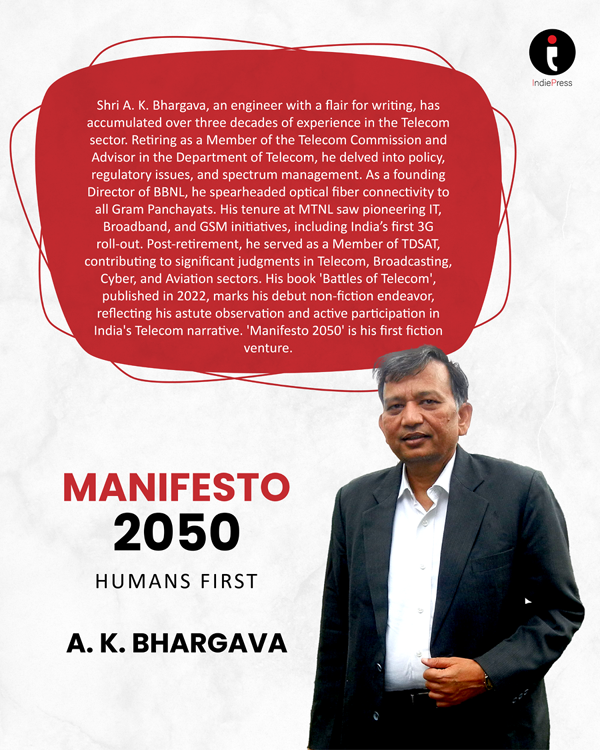- What motivated you to write this specific novel, and how did the plot develop?
As a professional interested in technology, policy, regulation, and law, I am fascinated by the impact of emerging technologies like AI. I have often wondered if the time frame is extended by twenty-five years from now, how would the world evolve, given the fact that technology is developing exponentially? I realized that any such speculation would mean entering into a realm of fiction. That is how the idea of writing a fictional book about what life would be like in 2050 emerged.
- Could you elaborate on your writing process? Do you have any special rituals or a set schedule that you follow to help you enter the creative flow?
I am an engineer turned writer. Hence the writing process resembles that of a project. It begins by defining an objective, breaking it down into pieces, and joining them by planning ahead. This allows for a creative flow that generates subplots within a broader plot.
- Your book has a cast of distinctly unique and endearing characters. Did they come from your imagination alone, or are they based on actual people?
The characters in this book are based on a conceptual framework. This framework takes shape through two distinct types of characters which are humans and their counterparts humanoids. They are connected through what I call ‘Architecture’. While naming the humanoid characters, I relied upon slang and colloquial words rather than technical terms or jargon to make them catchy and relatable.
- Your book explores [particular subject or concern]. What inspired you to investigate this theme, and from your writing, what discussions or lessons do you think readers will learn?
Instead of the popular theme of man-machine conflict, this book delves into the substitution effects of machines on mankind. At some point in time, this substitution will happen at such a rapid pace in so many unpredictable ways that our ability, to cope and adapt to the changes, would be tested to the limit. As I explore this theme, the core message that emerges is to keep ‘Humans First’.
- The world-building in your book is very detailed and captivating. What steps did you take to create the environment, and were there any historical events or real-world locales that you found inspiring?
The setting in this novel is a contemporary world extrapolated by twenty-five years. The modern-day elections are an occasion to talk about the issues and challenges that everyone faces and the manifestoes pretend to offer myriad solutions to them. In this novel, the issues are old but re-engineered to reflect the ‘futuristic reality’, and ‘Manifesto 2050’ offers solutions that are imaginative and idiosyncratic.
- As a writer, how do you strike a compromise between the genre’s expectations and the requirement for originality? Did you face any difficulties interpreting well-known components in your own way?
Of late, there have been discussions galore on AI. Since AI is at the center of the story, it was a challenge to keep the narrative original, lest it meanders into the familiar discourse. The idea of dealing with technological developments in a political context helped in retaining originality on familiar terrain.
- The story’s well-written flow keeps readers interested from beginning to end. Could you describe how you keep the story moving forward and creating tension?
The approach was to deal with a broad spectrum of social, cultural, economic, and political issues which allowed flexibility in interweaving them into personalized experiences. It enabled the construction of a narrative that was brisk and engaging.
- In a time when media and reader preferences are changing quickly, how do you see the traditional storytelling function changing, and how do you modify your work to appeal to modern audiences?
The youth of today is the wise man of tomorrow. Both young and old connect to technology, directly or indirectly. The storytelling has to reflect this shift. This book is an attempt in that direction.
Discover the Blueprint for a Human-Centric Tomorrow. Get Your Copy Today!





















